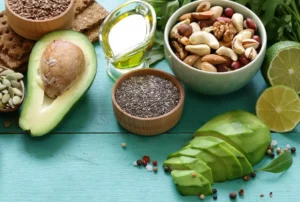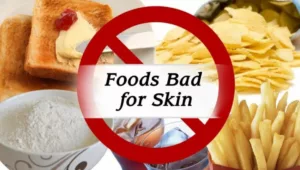Your Diet. Does What You Eat and Drink Affect Your Skin?
The skin is the body’s largest organ and is often considered a reflection of one’s overall health. While skincare products and routines can certainly help maintain healthy and radiant skin, the role of nutrition in skin health should not be underestimated. Your dietary choices can significantly impact the condition of your skin.
In this article, we will explore the various skin issues that may occur due to a poor diet We will provide 10 tips on the best foods for your skin, as well as the 10 worst foods for your skin, including the impact of certain drinks.
Skin Conditions Linked to Poor Diet
- Acne and Breakouts: A diet rich in sugary foods and high-glycemic carbohydrates can lead to increased insulin levels, stimulating oil production and clogging pores. This can result in acne breakouts, including whiteheads, blackheads, and inflamed pimples, affecting both adolescents and adults.
- Premature Ageing: An inadequate intake of antioxidants, vitamins, and minerals can accelerate skin ageing. Premature ageing signs, such as wrinkles, fine lines, and loss of skin elasticity, may appear earlier than expected.
- Psoriasis: A diet high in processed foods and saturated fats can trigger inflammation, potentially exacerbating psoriasis symptoms. This chronic skin condition is characterised by red, scaly patches that can become itchy and uncomfortable.
- Eczema: Eczema is often associated with food allergies or sensitivities. Consumption of allergenic foods can lead to flare-ups, causing red, itchy, and inflamed skin. A balanced diet and food avoidance based on allergenic triggers can help manage eczema symptoms.
- Dry Skin: Inadequate hydration and a diet low in essential fatty acids can result in dry, flaky skin. Omega-3 fatty acids found in foods like salmon and walnuts are crucial for maintaining skin’s moisture and suppleness.
- Inflammation: Consuming processed foods rich in trans fats, sugars, and artificial additives can lead to chronic inflammation, which is linked to various skin conditions, including eczema and psoriasis.
- Uneven Skin Tone: Excessive sun exposure combined with an imbalanced diet can lead to uneven skin pigmentation and sunspots. Certain nutrients, like vitamin C, can help protect the skin from UV damage.
So, we understand what are the typical skin conditions that can surface due to a poor or very bad diet. But what are the best and worst foods for your skin. We have produced a list of each of the very best foods for your skin and a list of those we believe are the worst to consume for your skin.

10 Best Foods for Your Skin
- Berries: Blueberries, strawberries, and raspberries are packed with antioxidants that protect against free radicals, keeping your skin youthful.
- Leafy Greens: Spinach, kale, and Swiss chard are loaded with vitamins A, C, and K, supporting collagen production and skin repair.
- Fatty Fish: Salmon, mackerel, and sardines provide omega-3 fatty acids that nourish and hydrate the skin from within.
- Avocado: This creamy fruit is a great source of healthy fats, vitamin E, and biotin, promoting skin health and radiance.
- Nuts and Seeds: Almonds, walnuts, and chia seeds contain essential nutrients like vitamin E, zinc, and omega-3s for skin repair and protection.
- Sweet Potatoes: Rich in beta-carotene, sweet potatoes help maintain a healthy complexion and protect against sun damage.
- Tomatoes: Lycopene in tomatoes helps protect your skin from UV rays and reduces the risk of sunburn.
- Green Tea: This beverage is packed with polyphenols that reduce inflammation and support overall skin health.
- Citrus Fruits: Oranges, lemons, and grapefruits are high in vitamin C, vital for collagen production and skin elasticity.
- Water: Staying well-hydrated keeps your skin moisturized, improving its overall appearance and texture.

10 Worst Foods and Drinks for Your Skin
- Sugar: Excess sugar can lead to increased inflammation, causing acne breakouts and premature ageing.
- Processed Foods: Processed foods are full of trans fats and artificial additives, these foods contribute to inflammation and skin issues.
- Dairy: For some individuals, dairy consumption may trigger or worsen acne breakouts.
- Fried Foods: The high levels of unhealthy fats in fried foods can clog pores and lead to acne.
- Soda: Sugary carbonated beverages can raise insulin levels, potentially causing acne and skin ageing.
- Excessive Alcohol: Alcohol dehydrates the skin, leading to dryness, redness, and exacerbating conditions like rosacea.
- Salt: High-sodium diets can lead to water retention and puffiness, making your skin appear bloated.
- Caffeine: Excessive caffeine intake can dehydrate the skin, leading to dryness and potentially exacerbating skin conditions.
- Red Meat: High consumption of red meat may increase the risk of skin issues due to its saturated fat content.
- Processed Meats: Processed meats contain preservatives that can contribute to inflammation and worsen skin conditions.
Remember, the very best nutritional diet does NOT necessarily mean you will have excellent skin health and appearance. At Skin Revision, in Beaconsfield, Buckinghamshire, we understand the importance of great nutritionist but there are so many other very important aspects you need to take into account to give you the best chance of great skin. A consultation with Skin Revision, or the Skin Nutritionist, will keep you the right track to realise better skin, and importantly, help maintain great skin.
Conclusion
Your nutritional diet plays a vital role in the health and appearance of your skin. By making informed choices and including skin-friendly foods in your diet while avoiding those that can harm your skin, you can take significant steps toward achieving and maintaining healthy, clear, smooth, bright and even glowing skin. Remember that individual responses to foods can vary, so it’s essential to pay attention to how your skin reacts to different dietary changes. Always consult with a registered nutritionist for personalised guidance on your specific nutritional needs.

